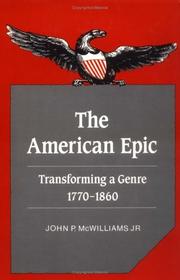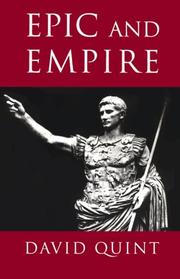| Listing 1 - 7 of 7 |
Sort by
|
Book
ISBN: 1597977721 9781597977722 9781597976824 1597976822 Year: 2012 Publisher: Washington, D.C. Potomac Books
Abstract | Keywords | Export | Availability | Bookmark
 Loading...
Loading...Choose an application
- Reference Manager
- EndNote
- RefWorks (Direct export to RefWorks)
The fascinating biography of one of America's most colorful diplomats
Politicians --- Diplomats --- Poets, American --- American poets --- Barlow, Joel,
Book
Year: 1943 Publisher: Chicago, Ill. : University of Chicago press,
Abstract | Keywords | Export | Availability | Bookmark
 Loading...
Loading...Choose an application
- Reference Manager
- EndNote
- RefWorks (Direct export to RefWorks)
Barlow, Joel, --- Dwight, Timothy, --- Humphreys, David, --- Trumbull, John,
Book
ISBN: 1421401584 0801897696 Year: 2011 Publisher: Baltimore : Johns Hopkins University Press,
Abstract | Keywords | Export | Availability | Bookmark
 Loading...
Loading...Choose an application
- Reference Manager
- EndNote
- RefWorks (Direct export to RefWorks)
"Poet, republican, diplomat, and entrepreneur, Joel Barlow filled many roles and registered impressive accomplishments. In the first biography of this fascinating figure in decades, Richard Buel Jr. recounts the life of a man more intimately connected to the Age of Revolution than perhaps any other American. Barlow was a citizen of the revolutionary world, and his adventures throughout the United States and Europe during both the American and French Revolutions are numerous and notorious. From writing his epic poem, The Vision of Columbus, to plotting a republican revolution in Britain to negotiating the release of American sailors taken captive by Barbary pirates, Joel Barlow personified the true spirit of the tumultuous times in which he lived. No one witnessed more climactic events or interacted with more significant people than Joel Barlow. It was his unique vision, his unfailing belief in republicanism, and his entrepreneurial spirit that drove Barlow to pursue the revolutionary ideal in a way more emblematic of the age than the lives of many of its prominent heroes. Buel is a knowledgeable guide, and in telling Barlow's story he explores the cultural landscape of the early American republic and engages the broader themes of the Age of Revolution. Few books explore in such a comprehensive fashion the political, economic, ideological, diplomatic, and technological dimensions of this defining moment in world history."--Front flap.
Poets, American --- Diplomats --- Politicians --- Barlow, Joel, --- American poets --- Citizen of New-York,
Book
Year: 1943 Publisher: Chicago, Ill., : University of Chicago Press,
Abstract | Keywords | Export | Availability | Bookmark
 Loading...
Loading...Choose an application
- Reference Manager
- EndNote
- RefWorks (Direct export to RefWorks)
American literature --- History and criticism --- Barlow, Joel, --- Dwight, Timothy, --- Humphreys, David, --- Trumbull, John, --- Connecticut --- Intellectual life

ISBN: 0805784500 Year: 1988 Publisher: Boston Twayne Publishers
Abstract | Keywords | Export | Availability | Bookmark
 Loading...
Loading...Choose an application
- Reference Manager
- EndNote
- RefWorks (Direct export to RefWorks)
American poetry --- History and criticism --- Barlow, Joel --- Criticism and interpretation --- Bradstreet, Anne Dudley --- Bryant, William Cullen --- Dwight, Timothy --- Emerson, Ralph Waldo --- Franklin, Benjamin --- Freneau, Philip Morin --- Holmes, Oliver Wendell --- Lanier, Sidney --- Lowell, James Russell --- Melville, Herman --- Poe, Edgar Allan --- Taylor, Edward --- Timrod, Henry --- Irving, Washington --- Wheatley, Phillis --- Whitman, Walt --- Whittier, John Greenleaf --- Wigglesworth, Michael

ISBN: 0521373220 0521107024 0511666632 Year: 1990 Publisher: Cambridge Cambridge University Press
Abstract | Keywords | Export | Availability | Bookmark
 Loading...
Loading...Choose an application
- Reference Manager
- EndNote
- RefWorks (Direct export to RefWorks)
John McWilliams's 1990 book was the first thorough account of the many attempts to fashion an epic literature (the anxiously anticipated 'American Epic') from a wide range of potentially heroic New World subjects. At the outset, McWilliams considers the many problems - cultural, political and literary' - of adapting Enlightenment views of republican progress to a genre that had traditionally celebrated the greatness of warriors. After a survey of the many epic poems written during and after the American Revolution, McWilliams shows how and why the epic had to be transformed from imitative narrative poetry into the new, open genres of prose history (Irving, Prescott and Parkman), fictional romance (Cooper and Melville) and free verse (Whitman). Believing that reviews are an important and slighted agent of literary change, McWilliams has written his book in the form of chronological literary history. His book, however, is no march of dates within tired categories. The American Epic suggests that imaginative writers of the Romantic era were in fact far less proscriptive about the boundaries of literary genre than many a twentieth-century writer and scholar.
Poetry --- Fiction --- American literature --- anno 1800-1899 --- anno 1700-1799 --- Epic literature [American ] --- History and criticism --- Revolutionary period, 1775-1783 --- 1783-1850 --- Barlow, Joel --- Criticism and interpretation --- Cooper, James Fenimore --- Dwight, Timothy --- Melville, Herman --- Prescott, William Hickling --- Simms, William Gilmore --- Trumbull, John --- Whitman, Walt --- Irving, Washington --- Parkman, Francis --- Paulding, James Kirke --- Arts and Humanities --- Literature --- Epic literature, American --- American epic literature --- History and criticism. --- United States --- Intellectual life

ISBN: 0691015201 Year: 1992 Publisher: Princeton, N.J. Princeton University Press
Abstract | Keywords | Export | Availability | Bookmark
 Loading...
Loading...Choose an application
- Reference Manager
- EndNote
- RefWorks (Direct export to RefWorks)
Alexander the Great, according to Plutarch, carried on his campaigns a copy of the Iliad, kept alongside a dagger; on a more pronounced ideological level, ancient Romans looked to the Aeneid as an argument for imperialism. In this major reinterpretation of epic poetry beginning with Virgil, David Quint explores the political context and meanings of key works in Western literature. He divides the history of the genre into two political traditions: the Virgilian epics of conquest and empire that take the victors' side (the Aeneid itself, Camoes's Lusíadas, Tasso's Gerusalemme liberata) and the countervailing epic of the defeated and of republican liberty (Lucan's Pharsalia, Ercilla's Araucana, and d'Aubigné's Les tragiques). These traditions produce opposing ideas of historical narrative: a linear, teleological narrative that belongs to the imperial conquerors, and an episodic and open-ended narrative identified with "romance," the story told of and by the defeated. Quint situates Paradise Lost and Paradise Regained within these rival traditions. He extends his political analysis to the scholarly revival of medieval epic in the late eighteenth and nineteenth centuries and to Sergei Eisenstein's epic film, Alexander Nevsky. Attending both to the topical contexts of individual poems and to the larger historical development of the epic genre, Epic and Empire provides new models for exploring the relationship between ideology and literary form.
Epic poetry --- Literary form. --- Literature and history. --- History and criticism. --- Genres [Letterkundige ] --- Genres [Literaire ] --- Genres littéraires --- Geschiedenis en literatuur --- Geschiedenis en poëzie --- Histoire et littérature --- Histoire et poésie --- Letterkundige genres --- Littérature et histoire --- Poésie et histoire --- Poëzie en geschiedenis --- Poetry --- History --- History and criticism --- Literature and history --- Literary form --- Politiek. --- Epiek. --- Epic poetry. --- 17.86 literary genres, theory of genre. --- Heroic poetry --- History and literature --- History and poetry --- Poetry and history --- Form, Literary --- Forms, Literary --- Forms of literature --- Genre (Literature) --- Genre, Literary --- Genres, Literary --- Genres of literature --- Literary forms --- Literary genetics --- Literary genres --- Literary types (Genres) --- Literature --- Acoma pueblo. --- Ahl, Frederick. --- Ancients and Modems. --- Ascoli Piceno. --- Barchiesi, Alessandro. --- Barlow, Joel. --- Bentley, Richard. --- Borges, Jorge Luis. --- Brecht, Bertolt. --- Brooks, Peter. --- Caesar, Julius. --- Caesarion. --- Carausius. --- Cicero. --- Cleanthes. --- Dias, Bartolomeu. --- Donation of Constantine. --- Duggan, Joseph. --- Eikon Basilike. --- Empson, William. --- Este family. --- Fawkes, Guy. --- Fowler, Alastair. --- Fronde. --- Getto, Giovanni. --- Guarini, Battista. --- Góis, Damião de. --- Hartman, Geoffrey. --- Herodotus. --- Horace. --- Jamestown settlement. --- Josephus. --- Kalevala. --- Lagos, Ramona. --- Leo X, Pope. --- Loyola, Ignatius. --- Martello, Francesco. --- Michel, Francisque. --- Moctezuma. --- Naevius. --- Napoleon Bonaparte. --- New Historicism. --- Onate, Juan de. --- Parthia and Parthians. --- Peisistratus. --- Polybius. --- Quintilian. --- anabaptism. --- census. --- civil war. --- history and narrative. --- imitation.
| Listing 1 - 7 of 7 |
Sort by
|

 Search
Search Feedback
Feedback About UniCat
About UniCat  Help
Help News
News